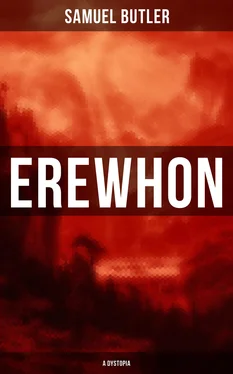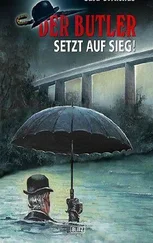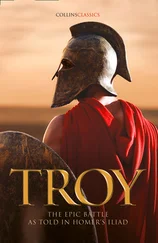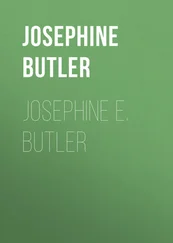For myself I was open-mouthed with astonishment. Chowbok rolled the bales rapidly into their place, and stood before me shuddering as in great fear; horror was written upon his face—this time quite involuntarily—as though the natural panic of one who had committed an awful crime against unknown and superhuman agencies. He nodded his head and gibbered, and pointed repeatedly to the mountains. He would not touch the grog, but, after a few seconds he made a run through the wool-shed door into the moonlight; nor did he reappear till next day at dinner-time, when he turned up, looking very sheepish and abject in his civility towards myself.
Of his meaning I had no conception. How could I? All I could feel sure of was, that he had a meaning which was true and awful to himself. It was enough for me that I believed him to have given me the best he had and all he had. This kindled my imagination more than if he had told me intelligible stories by the hour together. I knew not what the great snowy ranges might conceal, but I could no longer doubt that it would be something well worth discovering.
I kept aloof from Chowbok for the next few days, and showed no desire to question him further; when I spoke to him I called him Kahabuka, which gratified him greatly: he seemed to have become afraid of me, and acted as one who was in my power. Having therefore made up my mind that I would begin exploring as soon as shearing was over, I thought it would be a good thing to take Chowbok with me; so I told him that I meant going to the nearer ranges for a few days’ prospecting, and that he was to come too. I made him promises of nightly grog, and held out the chances of finding gold. I said nothing about the main range, for I knew it would frighten him. I would get him as far up our own river as I could, and trace it if possible to its source. I would then either go on by myself, if I felt my courage equal to the attempt, or return with Chowbok. So, as soon as ever shearing was over and the wool sent off, I asked leave of absence, and obtained it. Also, I bought an old pack-horse and pack-saddle, so that I might take plenty of provisions, and blankets, and a small tent. I was to ride and find fords over the river; Chowbok was to follow and lead the pack-horse, which would also carry him over the fords. My master let me have tea and sugar, ship’s biscuits, tobacco, and salt mutton, with two or three bottles of good brandy; for, as the wool was now sent down, abundance of provisions would come up with the empty drays.
Everything being now ready, all the hands on the station turned out to see us off, and we started on our journey, not very long after the summer solstice of 1870.
Chapter III.
Up the River
Table of Contents
The first day we had an easy time, following up the great flats by the river side, which had already been twice burned, so that there was no dense undergrowth to check us, though the ground was often rough, and we had to go a good deal upon the riverbed. Towards nightfall we had made a matter of some five-and-twenty miles, and camped at the point where the river entered upon the gorge.
The weather was delightfully warm, considering that the valley in which we were encamped must have been at least two thousand feet above the level of the sea. The river-bed was here about a mile and a half broad and entirely covered with shingle over which the river ran in many winding channels, looking, when seen from above, like a tangled skein of ribbon, and glistening in the sun. We knew that it was liable to very sudden and heavy freshets; but even had we not known it, we could have seen it by the snags of trees, which must have been carried long distances, and by the mass of vegetable and mineral débris which was banked against their lower side, showing that at times the whole river-bed must be covered with a roaring torrent many feet in depth and of ungovernable fury. At present the river was low, there being but five or six streams, too deep and rapid for even a strong man to ford on foot, but to be crossed safely on horseback. On either side of it there were still a few acres of flat, which grew wider and wider down the river, till they became the large plains on which we looked from my master’s hut. Behind us rose the lowest spurs of the second range, leading abruptly to the range itself; and at a distance of half a mile began the gorge, where the river narrowed and became boisterous and terrible. The beauty of the scene cannot be conveyed in language. The one side of the valley was blue with evening shadow, through which loomed forest and precipice, hillside and mountain top; and the other was still brilliant with the sunset gold. The wide and wasteful river with its ceaseless rushing—the beautiful water-birds too, which abounded upon the islets and were so tame that we could come close up to them—the ineffable purity of the air—the solemn peacefulness of the untrodden region—could there be a more delightful and exhilarating combination?
We set about making our camp, close to some large bush which came down from the mountains on to the flat, and tethered out our horses upon ground as free as we could find it from anything round which they might wind the rope and get themselves tied up. We dared not let them run loose, lest they might stray down the river home again. We then gathered wood and lit the fire. We filled a tin pannikin with water and set it against the hot ashes to boil. When the water boiled we threw in two or three large pinches of tea and let them brew.
We had caught half a dozen young ducks in the course of the day—an easy matter, for the old birds made such a fuss in attempting to decoy us away from them—pretending to be badly hurt as they say the plover does—that we could always find them by going about in the opposite direction to the old bird till we heard the young ones crying: then we ran them down, for they could not fly though they were nearly full grown. Chowbok plucked them a little and singed them a good deal. Then we cut them up and boiled them in another pannikin, and this completed our preparations.
When we had done supper it was quite dark. The silence and freshness of the night, the occasional sharp cry of the wood-hen, the ruddy glow of the fire, the subdued rushing of the river, the sombre forest, and the immediate foreground of our saddles packs and blankets, made a picture worthy of a Salvator Rosa or a Nicolas Poussin. I call it to mind and delight in it now, but I did not notice it at the time. We next to never know when we are well off: but this cuts two ways,—for if we did, we should perhaps know better when we are ill off also; and I have sometimes thought that there are as many ignorant of the one as of the other. He who wrote, “O fortunatos nimium sua si bona nôrint agricolas,” might have written quite as truly, “O infortunatos nimium sua si mala nôrint”; and there are few of us who are not protected from the keenest pain by our inability to see what it is that we have done, what we are suffering, and what we truly are. Let us be grateful to the mirror for revealing to us our appearance only.
We found as soft a piece of ground as we could—though it was all stony—and having collected grass and so disposed of ourselves that we had a little hollow for our hip-bones, we strapped our blankets around us and went to sleep. Waking in the night I saw the stars overhead and the moonlight bright upon the mountains. The river was ever rushing; I heard one of our horses neigh to its companion, and was assured that they were still at hand; I had no care of mind or body, save that I had doubtless many difficulties to overcome; there came upon me a delicious sense of peace, a fulness of contentment which I do not believe can be felt by any but those who have spent days consecutively on horseback, or at any rate in the open air.
Читать дальше












